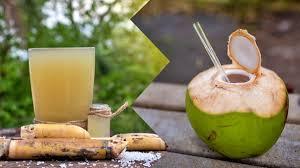Coconut Water Market growth driven by health-conscious consumers worldwide

The growing demand within the coconut water market is being strongly influenced by a global shift toward health consciousness. Consumers across regions are moving away from sugary sodas and synthetic beverages in favor of natural, nutrient-rich alternatives. Coconut water, with its low-calorie count, high potassium content, and natural hydration benefits, has emerged as a top contender in the health beverage segment.
Rising Global Health Consciousness
Over the past decade, health awareness has transitioned from a trend to a global movement. With increasing incidences of obesity, diabetes, and cardiovascular conditions, people are more inclined to make informed dietary choices. As a result, functional beverages like coconut water have gained significant popularity.
Millennials and Gen Z, in particular, are championing the wellness revolution. These demographics are not only more health-aware but are also more willing to invest in premium, clean-label beverages that align with their lifestyle. This has accelerated market expansion, especially in urban areas and developed economies.
Nutritional Profile Boosting Coconut Water's Appeal
Coconut water is packed with essential electrolytes—potassium, magnesium, and calcium—making it a powerful hydrator. It is often recommended post-exercise, during illness, or even as a hangover remedy. Unlike artificial sports drinks, coconut water offers these benefits without added sugars or synthetic additives.
Scientific studies highlighting the natural health benefits of coconut water have further added credibility to its claims. Consumers are increasingly prioritizing products backed by data and transparency, and coconut water brands have embraced this by clearly labeling nutritional content and emphasizing “no added sugar” formulations.
Consumer Demand Across Fitness and Wellness Sectors
Fitness centers, yoga studios, and wellness retreats have become major coconut water distribution points. Endorsements by athletes, fitness influencers, and nutritionists have helped position coconut water as a superior post-workout beverage.
Moreover, dieticians are recommending coconut water as a healthy alternative to fruit juices that are high in sugar. It is also being incorporated into detox programs and intermittent fasting routines due to its low glycemic index and natural isotonic properties.
Regional Growth Hotspots
While North America and Europe remain mature markets, emerging economies in Asia-Pacific and Latin America are experiencing exponential growth. In these regions, coconut water consumption is driven not just by health but also by availability, cultural relevance, and increased disposable income.
Countries like India, the Philippines, Brazil, and Thailand have seen significant surges in both domestic consumption and export volumes. Brands are leveraging local production to cater to growing demand with sustainable and ethical sourcing.
Product Innovations Accelerating Market Growth
To appeal to diverse consumer palates, companies are introducing flavored variants, including pineapple, mango, and coffee-infused coconut waters. Organic-certified, cold-pressed, and sparkling coconut water formats are also gaining traction, reflecting the broader trend of functional beverage premiumization.
Plant-based lifestyle trends have further boosted the innovation pipeline. Coconut water is increasingly being used as a base in smoothies, juices, and even cocktail mixers, expanding its utility and frequency of consumption.
Marketing Strategies Targeting Conscious Consumers
Health-focused branding strategies are pivotal in expanding market penetration. Brands are shifting from traditional marketing to wellness-centric campaigns. Packaging design, social media presence, and influencer collaborations now revolve around clean living, fitness, hydration, and sustainability.
Celebrity endorsements have also played a crucial role. Stars like Madonna and Rihanna, who have invested in coconut water brands, have brought significant visibility to the category.
Retail Dynamics and E-commerce Adoption
Coconut water is now widely available across supermarkets, organic stores, and convenience chains. However, the rapid rise of e-commerce has dramatically altered the retail landscape. Direct-to-consumer models are helping brands engage with consumers more deeply, offering subscription models, customization, and curated wellness bundles.
During the COVID-19 pandemic, e-commerce proved to be a resilient distribution channel, and post-pandemic habits have ensured that online retail continues to be a major sales driver.
Sustainability as a Parallel Growth Driver
The health-conscious consumer is often environmentally aware too. Coconut water brands are responding with sustainable harvesting practices, biodegradable packaging, and ethical labor sourcing. Initiatives such as using coconut husks for packaging and reducing carbon emissions during transportation are becoming standard.
Consumers are increasingly choosing brands that not only promote personal health but also contribute to planetary health, making sustainability a vital part of growth strategy.
Conclusion: A Robust Market Fueled by Informed Choices
The coconut water market's upward trajectory is closely tied to a global health movement that continues to evolve. With demand being driven by both nutritional value and lifestyle alignment, the category is poised for sustainable growth. From fitness enthusiasts to environmentally conscious millennials, a wide array of consumers are championing this natural beverage.
As the industry continues to innovate, expand regionally, and invest in sustainable practices, coconut water will remain a staple in the health beverage segment—refreshing, functional, and future-ready.
- Art
- Causes
- Crafts
- Dance
- Drinks
- Film
- Fitness
- Food
- Games
- Gardening
- Health
- Home
- Literature
- Music
- Networking
- Other
- Party
- Religion
- Shopping
- Sports
- Theater
- Wellness


